COVID-19 is increasing multiple kinds of inequality. Here’s what we can do about it

Women, alongside the poor, elderly, disabled and migrant populations, have borne the brunt of the fallout from the pandemic.
Image: REUTERS/Amanda Perobelli
Ian Goldin
Professor of Globalization and Development; Director, Oxford Martin Programme on Technological and Economic Change, Oxford Martin School, University of OxfordStay up to date:
Systemic Racism
- As well as a public health crisis, the COVID-19 pandemic has had a devastating impact on poverty levels and inequality.
- Women, alongside the poor, elderly, disabled and migrant populations, have borne the brunt of the fallout from the pandemic.
- Minorities have been hit harder and are recovering more slowly from the downturn.
Around the world, responses to the first and second waves of the COVID-19 pandemic are understandably focused on reducing infections and fatalities. There are also redoubled efforts to avoid the negative economic consequences of the outbreak, especially in relation to jobs, productivity and growth. But the pandemic is an economic wrecking ball, with intergenerational consequences. Global growth has plummeted. Furthermore, poverty levels are increasing and inequality is accelerating between and within countries. Surging inequality is dangerous, with knock-on effects on everything from rising crime to reactionary nationalism.
There are at least four ways the COVID-19 pandemic is increasing inequality:
- First, higher-paid workers are working from home while lower-paid blue-collar workers typically do not have this option.
- Second, a higher share of low-paid workers are in essential services such as nursing, policing, teaching, cleaning, refuse removal, and store attendants where they are more likely to come into contact with people who are infected.
- Third, lower paid workers are more represented in the sectors that have suspended activities such as hotels, restaurants and tourism services.
- Fourth, the pandemic is increasing poverty and inequality between richer countries that can afford to bail out their firms and provide social safety nets, and poorer countries that do not have the capacity to do so.
A recent survey of 37 countries indicates that 3 in 4 households suffered declining income since the start of the pandemic, with 82% of poorer households affected. The impacts on different communities depends entirely on their specific circumstances. In the US, for example, over 2 million more households claim that they do not have enough to eat since the pandemic. In fact, one in five African American households says they are going hungry.

Income inequality soaring
The pandemic is a boon for the ultra-rich. The staggering rise in the stock-market is testament to this. In the US, over 44 million people lost their jobs and unemployment surged towards 15% between April and June 2020. Yet the fortunes of the top five billionaires rose by $102 billion, increasing their wealth by 26%. In fact, the combined wealth of US billionaires increased by over $637 billion to a total of $3.6 trillion, which is considerably more than the entire wealth of the 54 countries on the African continent.
Some of the biggest winners are those with high stakes in the technology sector. Digital retail vendors, conferencing platforms and social media groups have reaped the benefit from the lockdown and the shift to remote work.
The increasing concentration of in-country inequality is signalled in our latest book, Terra Incognita: 100 Maps to Survive the Next 100 Years. Between 1980 and 2020, billionaires in the US saw their wealth soar by 1,130%, increasing more than 200 faster than median wages. At the same time, the tax obligations of billionaires in the US declined by 78% between 1980 and 2018 (measured as a percentage of their wealth).

The spectacular accumulation of wealth in the hands of a small minority is ramping-up pressure to tax the rich and their heirs. Among high-income countries, for example, the US has the highest level of wealth inequality, the second highest level of income inequality, after taxes and government transfers, and one of the lowest levels of intergenerational mobility. An individual’s future is largely determined by their parents’ income. In 2020 alone, children will inherit around $764 billion and pay an average of just 2.1% on this income. By contrast for working people, the average tax rate is 15.8%, seven times more. These disparities are further skewed by race, and the racial wealth gap is even larger than it was in 1968, at the peak of the struggle for civil rights.
Gender inequality increasing
Women, alongside the poor, elderly, disabled and migrant populations, have borne the brunt of the fallout from the pandemic. In the US, women accounted for 55% of all jobs lost, even though they make up under half of the total workforce. In the UK, women were about one third more likely to be working in a sector that shut down. And when they could continue working, mothers were one-and-a-half times more likely to stop work than fathers. Their greater loss reflects the fact that women are more likely to work in the services such as catering and hospitality which were closed down. These trends are likely to set back progress in gender equality.
In previous recessions, men have borne the brunt of job losses, due to the sensitivity of sectors such as construction and manufacturing to economic cycles. By contrast, the employment of women was more stable. This time is different. The COVID-19 pandemic has hit industries that are consumer-facing hardest, including small shops, restaurants, and airlines. In the UK, for example, an estimated two-thirds of the extra 40 hours a week of caring and childcare is conducted by mothers. And mothers working at home are 50% more likely to be interrupted than men.

Ethnic inequalities on the rise
As with previous crises, minorities are hit harder and recovering more slowly from the COVID-19 induced downturn. This is true both for workers and small businesses. Within a month of the pandemic hitting the US, 22% of small businesses went under. While 17% of white owned businesses failed, 41% of black owned businesses collapsed. One reason for this disparity is due to the way pandemic hotspots concentrated in poorer neighbourhoods. Black-owned businesses also generally had weaker underlying finances, fewer reserves, and much weaker contacts with banks and financial institutions empowered by the government to administer emergency grants.
The ethnic dimensions of inequality are clearly apparent in New York. Just 7% of the firms in the Bronx received grants, compared to over 12% in wealthier counties. In the UK, similar patterns are apparent. Whereas the median white British household has assets worth £282,000, for Black Caribbean households its less than a third of this (£89,000), for Black Africans barely 8% (£24,000), and Bangladeshi just 7% (£22,000). Wealth inequalities reflect inequalities on other dimensions, including with respect to income, where on average black workers earn 9% and Bangladeshi 20% less than white workers in Britain.
The pandemic is deepening geographic inequality with people living in poor places being more vulnerable to the health and economic impacts of the pandemic. Within rich countries, lower-income neighbourhoods are most at risk. For example, in New Orleans, people living on streets with a higher proportion of Black people were two to three times more likely to die from COVID-19 than streets with white people. These are also neighbourhoods previously devastated by Hurricane Katrina in 2005. Meanwhile, In the erstwhile industrial heartland of the UK, especially Yorkshire and the East Midlands, one in three jobs were lost or are at risk since the pandemic hit. This compares to London and its commuter belt where fewer than one in five jobs fall in this category.
Inequality creeping up between countries
COVID-19 may end up being the most significant development setback of our lifetimes. The pandemic is reversing decades of progress in poverty reduction, the promotion of education, health improvements and overall wellbeing as the livelihoods of billions of people are being destroyed. There are signs that the pandemic may have pushed at least an additional 100 million people into extreme poverty. What is more, acute hunger doubled in 2020 to 260 million people. Indeed, many more people will die of starvation and poverty-related causes than the direct health impacts of COVID-19.
Bad as they are, the economic impacts of COVID-19 are still hidden from view. This is because roughly a third of workers worldwide, around 2 billion people, work in the informal sector. Most of these jobs are in developing countries. The livelihoods of an estimated 1.6 billion, or 80% of the total are threatened by the pandemic. While the stringency of the lockdowns in lower- and medium-income countries match and in many cases exceed those of wealthier countries, their governments are far less able to support their citizens and firms.
The IMF estimates that developing countries require $2.5 trillion to recover from the COVID-19 pandemic. And yet they have received less than $100 billion, which is less than 1% of what the rich countries have unlocked for their economies. To make matters even worse, at a time of unparalleled crisis, overseas aid budgets are contracting since they are typically calculated as a share of wealthier nations’ national income. When the donor economies contract, so does aid. UK aid, for example, in 2020 is down several billion pounds from the previous year.
There are dangerous signs that rising inequality could threaten the stability of political systems of nations and undermine their ability to address our shared challenges. The focus now quickly needs to turn to ensuring that we build more inclusive societies at home and abroad.
Among the urgent actions required to reverse inequality are the introduction of more progressive systems of taxation and redistribution and closure of tax havens that allow individuals and companies to avoid their responsibilities to societies. Investments in health, education and infrastructure in deprived areas are particularly vital, as are investments in affordable housing and other measures to increase mobility, allowing individuals to move to dynamic centres which offer jobs and higher incomes.
The short-term impact of the pandemic requires unprecedented measures to support the growing numbers of unemployed, with record low interest rates allowing this to be funded by debt. Most developing countries cannot create more debt, and so much greater levels of international solidarity are needed to assist these countries, including through the writing off of their debt, increases in aid, and ensuring that the International Monetary Fund, World Bank and other development institutions are able to meet the needs of this poverty and inequality reduction challenge.
Don't miss any update on this topic
Create a free account and access your personalized content collection with our latest publications and analyses.
License and Republishing
World Economic Forum articles may be republished in accordance with the Creative Commons Attribution-NonCommercial-NoDerivatives 4.0 International Public License, and in accordance with our Terms of Use.
The views expressed in this article are those of the author alone and not the World Economic Forum.
Forum Stories newsletter
Bringing you weekly curated insights and analysis on the global issues that matter.
More on Health and Healthcare SystemsSee all
Gaurav Ghewade
April 23, 2025
Naoko Tochibayashi and Mizuho Ota
April 7, 2025
Charlotte Ersboll and Kusum Kali Pal
April 7, 2025





